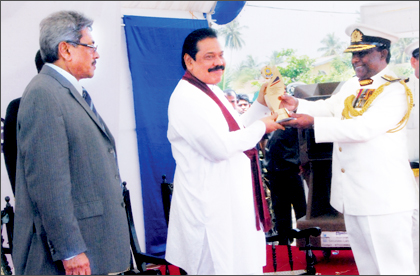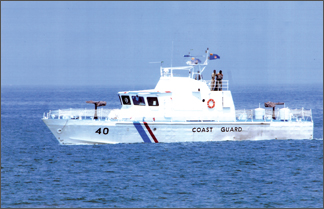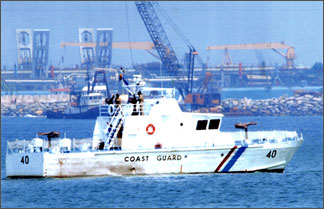|
Sri Lanka Coast Guard:
Keeping our seas safe
by Jayampathy Jayasinghe
|

President Mahinda Rajapaksa at the inauguration of the
coastguard agency. Secretary Ministry of Defence Gotabhaya
Rajapaksa and Director General of the Sri Lanka Coast Guard,
Rear Admiral Daya Dharmapriya are also in the picture.
|
The Sri Lanka Coast Guard is the newest law enforcement agency in the
country empowered with the task of searching ships and other craft, to
detain such vessels if they have violated any laws of the land and to
arrest persons engaged in illegal activity such as illegal human
trafficking or illegal fishing. However, the most important task of the
agency is to protect the territorial waters of the country as
promulgated in Act No. 14 of 2009 of the Coast Guard.
The Sri Lanka Coast Guard was the brainchild of President Mahinda
Rajapaksa who as the then Minister of Public Security, Law and Order saw
the importance and the urgency of setting up such an agency to protect
the seas around the country. Subsequently, he presented a Cabinet paper
in January 2008 to appoint a Director General for the Sri Lanka Coast
Guard. Following this move, Rear Admiral L. Daya Dharmapriya was
appointed as the first Director General of the Sri Lanka Coast Guard by
the Cabinet of Ministers on March 27, 2008. Rear Admiral Dharmapriya, a
veteran seafarer with salt in his veins, became the unanimous choice for
the job.
Meanwhile, the Coast Guard Act No. 14 of 2009 that incorporated the
Department of Coast Guard and its operational activities was enacted by
Parliament. President Rajapaksa as the Chief Guest, ceremonially
inaugurated the Coast Guard agency on March 4, 2010.
 |
|

New coast guard ships at Mirissa and Colombo |
The Coast Guard Department is a non-military law enforcement agency
that comes under the purview of the Ministry of Public Security, Law and
Order. In fact, coastguard officers function as "Peace Officers". They
are marine policemen who keep vigil at sea round the clock to monitor
activities.
Naturally a question would arise in the minds of people as to why
such an agency wasn't already in operation. However, with the increase
of maritime activity on the seas around the island, the setting up of a
coastguards agency became a necessity. With the enactment of the
Coastguard Act No. 14 laws relating to maritime activity was
promulgated. The Act provides teeth to the Coast Guards to combat
illegal activity and to play a supervisory role on the seas. The
function of the Coast Guard Department is to implement the laws of the
land and international laws on the territorial waters of Sri Lanka.
According to stipulated international laws, Sri Lanka benefits from oil
drilling in the seabed located in the exclusive economic zone extending
up to 200 nautical miles.
Peace Officers
The Director General of the Sri Lanka Coast Guard, Rear Admiral Daya
Dharmapriya told the Sunday Observer that coastguard officers who are
designated as Peace Officers are empowered to enforce local and
international laws. The Sri Lanka Navy, at some point of time when
Emergency Laws are lifted will not be empowered to carry on with such
tasks. The main function of the Sri Lanka Coast Guard was to enforce the
laws of the land and the international law in the maritime zones, he
said.
The Coast Guards' head office is in Colombo while its first base was
set up at Mirissa. Meanwhile, a regional office has been opened in Galle.
"We hope to open bases in all ports and fisheries harbours in the near
future. Our plan for this year is to open bases at Oluvil and Kalpitiya.
A base at Trincomalee will be set up next year. By 2012, bases will be
opened at Mannar and Pooneryn as well," he said.
The Rear Admiral said their primary task involved enforcing law and
order in the seas around the island although the agency was named as the
Coast Guard. "We have four offshore patrol boats at present, but expect
more to be provided from the next budgetary allocation. As a matter of
fact, many countries including Japan, Australia and Italy have shown a
willingness to provide us with patrol boats since we are not linked to
the military. Ours is entirely a civil agency that controls merchant
shipping operations, " he said.
Asked whether the dumping of trash from ships to the sea has become a
problem, the Rear Admiral said although the matter comes under the
purview of the Marine Environment Protection Authority, the enforcement
of laws related to dumping of pollutants was carried out by the Coast
Guard. Rear Admiral Dharmapriya who is also a director of the Marine
Environment Protection Authority said the agency was more involved in
drawing up laws. "Discharge of garbage and fuel to the seas from ships
is prohibited. However, such laws were not in place about three years
ago. We now have the power to detain ships and impose fines when they
violate such laws," he said.
Teething problems
Like any other newly formed organisation, the coastguard agency is
woefully understaffed. It has teething problems with regard to staff and
equipment. The agency is manned by a staff of 250 retired Navy personnel
who have basic training for the job. Rear Admiral Dharmapriya said a
staff of 2000 was needed to effectively man the sea around Sri Lanka.
"It will take at least four years to recruit and train coastguards.
We are planning to recruit another 1000 retired naval personnel who are
most suited for the job." He said three patrol craft are being deployed
in the seas off the Southern coast and a small boat is deployed in the
Colombo harbour to investigate reported cases."
He said illegal activities such as drug smuggling, human trafficking
and piracy on the seas have to be curbed to make the sea lanes safe.
Another daunting problem was the dumping of toxic waste in the seas
around Sri Lanka. The sea bed around the island is rich with natural
resources which have not been exploited as yet.
"Even the Internet lines and the submarine cable that link Sri Lanka
to the world is placed on the sea bed. The oil brought from ships to Sri
Lanka is pumped to the Kolonnawa pipelines five miles away from the
coast. Therefore, the coastguard service is necessary to protect these
vital installations," he said. |

